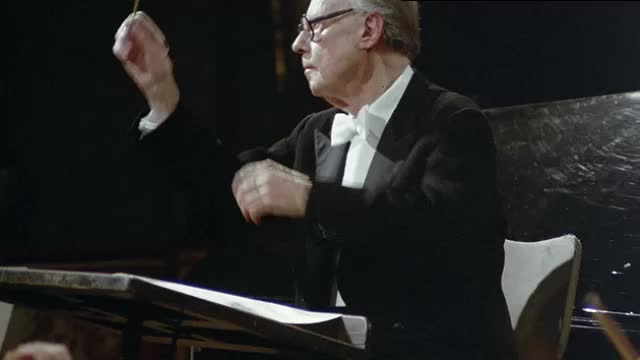Maurizio Pollini’s parents were both artistically inclined. His mother was a singer, whilst his father Gino Pollini not only played the violin, but was in the forefront of contemporary architectural design in Italy. Pollini’s early studies were with Carlo Lonati and then with Carlo Vidusso at the Milan Conservatory from the age of thirteen. At fourteen, Pollini played the complete Chopin études in public, and when he was fifteen he won second prize at the Geneva International Piano Competition in a year where no first prize was awarded. Two years later he won the Ettore Pozzoli International Piano Competition and in 1960 won the prestigious International Chopin Piano Competition in Warsaw. However, at eighteen years old he was not fully equipped to take on a huge workload of concerts, nor did he want to become known only as a Chopin player. A planned tour of America was cancelled, and his advertised London debut was twice postponed. It is not true however, as some sources state, that Pollini practically retired from public life for almost seven years, reappearing in 1968; in fact he made his London debut in April 1963 (when he did not receive good reviews for his rushed performance of Beethoven’s Piano Concerto No. 3 with the London Symphony Orchestra and Colin Davis). The critic of The Times noted that ‘…his only concern seemed to be getting the notes over and done with as soon as possible.’
Pollini took a few lessons from Arturo Benedetti Michelangeli in 1961, but also acknowledges pianists of his youth including Wilhelm Backhaus, Clara Haskil, Edwin Fischer, Alfred Cortot and Arthur Rubinstein. When he did resume touring in 1968 he was a finished artist who took his place at the forefront of the world’s great pianists, playing and touring in Britain, Europe, America and Japan.
Pollini became an advocate of contemporary music and performed works by Schoenberg and Webern as well as Stockhausen, Nono, Manzoni and Sciarrino. His analytical approach to music is ideal for these works, but for the more Romantic repertoire, Pollini has been accused, more so now than at the beginning of his career, of a coldness and aloofness in his interpretations. In 1984 Nicholas Kenyon asked why at times Pollini’s playing sounded ‘blank, rather clamourous and uninvolved’. In January 2000 Tim Parry began his review of Pollini’s disc of Chopin’s ballades with the words, ‘Wherever you stand on the “great Pollini debate”…’, whilst Michael Glover in 1998 wrote of his dislike of Pollini in no uncertain terms. Referring to a recent recital at London’s Royal Festival Hall he wrote of ‘…the Italian’s faceless, four-square Chopin and pedestrian Debussy’. He describes Pollini’s playing as ‘…that of an artist who has internalised his music-making to such an extent that a nullifying block has arisen between the emotions he is experiencing whilst playing and any communication of these forces at the keyboard’.
However, Pollini has his admirers, and audiences are eager to hear his Beethoven, Schumann, Chopin and Debussy: all composers who feature prominently in his repertoire. Pollini also plays Schubert and Brahms and has an inherent sense of formal structure, where each work he performs is built on salient architectural lines. For all the controversy Pollini generates in the press and amongst record collectors, he is not an artist of wayward intentions; his style may have changed over the years, but Pollini can still be classed as one of the great pianists of his era.
Pollini recorded his prize-winning performance of Chopin’s Piano Concerto No. 1 in E minor Op. 11 in 1960 for EMI in London. It is still one of the best recordings of this work. In 1968 he recorded some solo works of Chopin for EMI in Paris, but from 1971 Pollini has recorded exclusively for Deutsche Grammophon. His output over the past thirty years has not been a large one, yet it covers the major areas of his repertoire. Some of his recordings have attained almost legendary status, such as Stravinsky’s Three Movements from Petrushka, Boulez’s Piano Sonata No. 2, Prokofiev’s Piano Sonata No. 7 Op. 83 and Chopin’s twenty-four études. In these recordings Pollini’s superb technique gets ample display, and live performances of the same works have had just as much adrenalin, excitement and accuracy. Excellent recordings of Chopin from the mid-1970s include a selection of the polonaises and a disc of the twenty-four Préludes Op. 28.
Pollini has recorded core repertoire including Schubert’s ‘Wanderer’ Fantasy D. 760 and Piano Sonata in B flat D. 960, Schumann’s Fantasie Op. 17, Liszt’s Piano Sonata in B minor, and the last five of Beethoven’s piano sonatas. He has recorded both Brahms’s piano concertos, Bartók’s Piano Concertos Nos 1 and 2 and Schoenberg’s Piano Concerto, as well as all five of Beethoven’s concertos twice, the second time with Claudio Abbado and the Berlin Philharmonic Orchestra. His important interpretations of contemporary music include recordings of Boulez’s Piano Sonata No. 2, a disc of works by Luigi Nono, and the complete piano music of Arnold Schoenberg. Recent recordings of Chopin’s ballades and scherzos and Debussy’s préludes have received mixed reviews. Bryce Morrison thought that Pollini had ‘…lost contact with the central qualities of Debussy’s sound world’. Although he performed the first book of Bach’s Das wohltemperierte Klavier in public during Bach’s tercentenary year, so far Pollini has not recorded it, but he is continuing a long-term project to record the complete Beethoven piano sonatas.
© Naxos Rights International Ltd. — Jonathan Summers (A–Z of Pianists, Naxos 8.558107–10).
| Title | |
| BEETHOVEN, L. van: Piano Concerto No. 3 (Pollini, Bohm) | |

|
BEETHOVEN, L. van: Piano Concerto No. 3 (Pollini, Bohm)
Composer:
Beethoven, Ludwig van
Artists:
Bohm, Karl -- Pollini, Maurizio -- Vienna Philharmonic Orchestra
Label/Producer: UNITEL |
